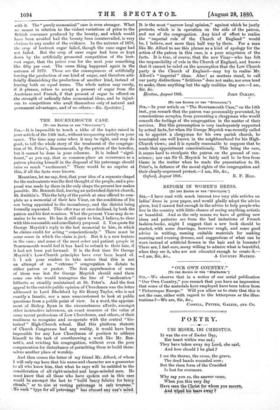THE BOURNEMOUTH CASE.
(To THE EDITOR OF THE "SPECTATOR.") Sta,—It is impossible to touch a tithe of the topics raised in your article of the 14th inst., without trespassing unduly on your space. The time may come when it may be right, and may clo good, to tell the whole story of the treatment of the congrega- tion of St. Peter's, Bournemouth, by the patron of the benefice, but it cannot be clone in your columns. It is indeed " signi: ficant," as you say, that so common-place an occurrence as a patron pleasing himself in the disposal of his patronage should raise so much "excitement." There would be no suprise at this, if all the facts were known.
Meantime, let me say, first, that your idea of a separate chapel for the malcontents was the first thought of the people, and a pro7 posal was made by them in the only hape the present law makes possible. Mr. Bennett died, leaving an unfiniaheddiatrict church, St. Swithin's. This the laity of the parish at once offered to com- plete as a memorial of their late Vicar, on the conditions of his son being appointed to the incumbency, and the dietriet being formally separated. This offer was at once declined, by both the patron and his first nominee. What the present Vicar may do re- mains to be seen. He has it still open to him, I believe, to close with this reasonable and conciliatory proposal 2. You quote Sir George Meyrick's reply to the last memorial to him, in which he claims credit for acting "conscientiously." There must be some sense in which the claim is just. But it is a new feature in the case ; and some of the most sober and patient people in Bournemouth would feel it less hard to submit to their fate, if it had not been put forward. It is the first time Sir George Meyrick's Low-Church principles have ever been heard of. 3. I ask your readers to take notice that this is not an attempt of an " extreme " congregation to dictate to either patron or pastor. The first apprehension of some of them was lest Sir George Meyrick should send them some one who would transgress the line of "moderation" hitherto so steadily maintained at St. Peter's. And the first appeal to the outside public opinion of Churchmen was the letter addressed to Lord Blachford by Sir Henry Taylor, who is not exactly a fanatic, nor a man unaccustomed to look at public questions from a public point of view. In a word, the appoint- ment of Bishop Ryan in the circumstances affords, amongst other instructive inferences, an exact measure of the value of some recent professions of Low Churchmen, and others, of their readiness to recognise and co-operate with the central " his- torical " High-Church school. Had this platform rhetoric of Church Congresses had any reality, it ,0,0 have been impossible for any Low Churchman of position to address himself to the task of overthrowing a work like Mr. Ben- nett's, and evicting his congregation, without even the poor compensation for disturbance of permitting them to 'build them- selves another place of worship.
And then comes the letter of my friend Mr. Alford, of whom I will only say here that his name and character are a guarantee to all who know him, that what he says will be entitled to the coneideration of all right-minded and large-minded men. He must know that all those who have spoken out in this case would be amongst the last to "build fancy fabrics for fancy rituals," or to aim at vesting patronage in sate trustees." No such "type for all"patronag— e " 'has etoitssed any pup's md. It is the most "narrow local opiniop," against which he justly protests, which is in operation on the side of the patron, iind not of the congregation. -Any kind of effort to realise the "imperial rule. of the Church of England" would be, I believe, met more than half way by them: For a man like Mr. Alford to use this phrase as a kind of apology for the action of the patron in this case, is a pure misprision of the facts. It is true, of course; that the new Vicar—who has felt the responsibility Of rule in the Church of England, and knows that it cannot be ruled on the assumption that the Low Church party 4 the Church of England—may try to real* Mr. -Ajferd's "imperial" ideas. Alas ! as matters stand, to call our party distinctions " fictitious " does not make, nor even tend to make, them anything but the ugly realities they are.—I am, &c.






























 Previous page
Previous page